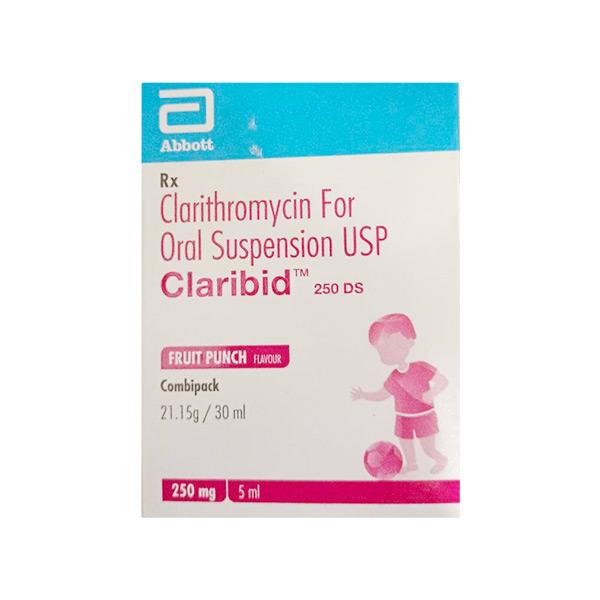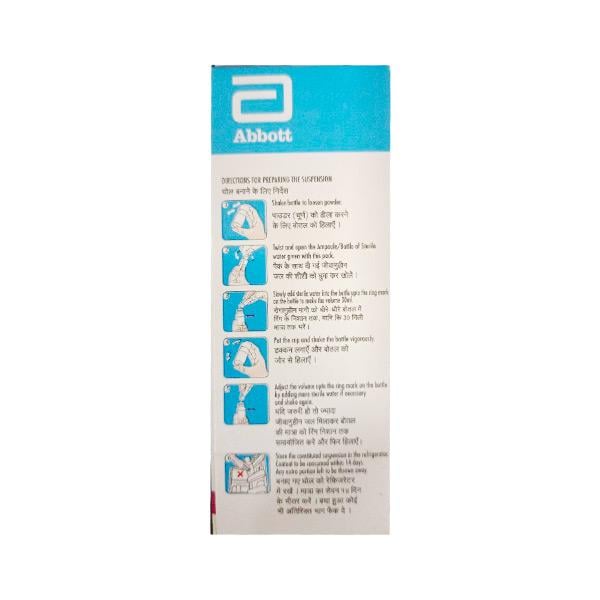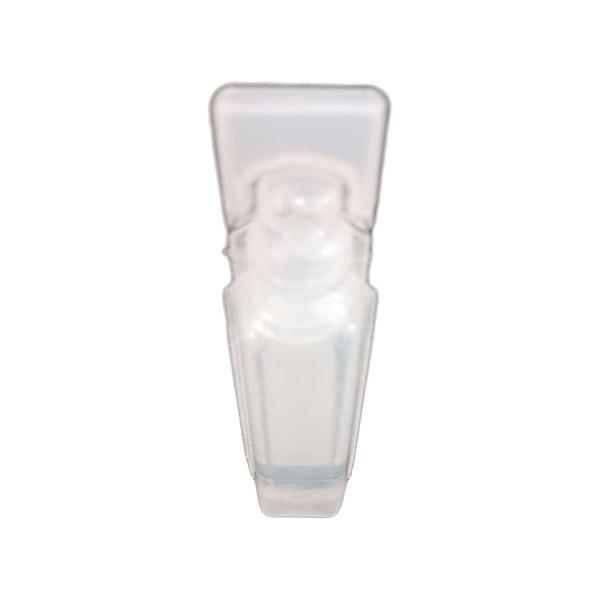

Netmeds First Membership
Quick Links
Introduction About CLARIBID DS 250 SYRUP
CLARIBID DS 250 SYRUP contains Clarithromycin which belongs to the group of medicines called Macrolide Antibiotics. It is used to manage bacterial infections in the chest, throat and sinuses in children above 6 months to 12 years of age. It is also used to manage inflammation of the middle ear (otitis media) and infections of the skin and the layers of flesh just under the skin.
Before prescribing this medicine, your doctor may want your child to undergo few diagnostic tests to determine the exact cause of your infection before starting with the medication.
Before giving CLARIBID DS 250 SYRUP to your child, inform your doctor if the child has been diagnosed with coronary artery disease, severe heart failure or slowed heart rate.
CLARIBID DS 250 SYRUP is not recommended in children with a history of heart rhythm disorders (such as ventricular cardiac arrhythmia, and fast heart rhythm), in ‘long QT syndrome’ (abnormality in electrocardiogram) and in children with severe liver or kidney disorders or those prone to fungal infections.
The most common side effect of taking this medicine is stomach pain, headache, diarrhoea, and insomnia. Consult a doctor immediately if any of the above symptoms worsen.
Uses Of CLARIBID DS 250 SYRUP
- Used to manage ear nose and throat infections, respiratory tract infections, skin and soft tissue infections in children
How CLARIBID DS 250 SYRUP Works
CLARIBID DS 250 SYRUP manages the growth of bacteria by interfering with its protein synthesis and binds specific proteins present in the bacterial ribosomes, thus stopping the growth of the bacteria inside the body, which helps to reduce the infection and its symptoms.
How to use CLARIBID DS 250 SYRUP
Give CLARIBID DS 250 SYRUP to your child as advised by your physician. It is for pediatric use.
Shake the bottle well to loosen the dry powder. Add the sterile water provided with this pack up to the ring mark present on the bottle surface. Add extra water if required to adjust the volume up to the ring mark. Close the bottle tightly and shake the mixture well.
Your doctor will decide the correct dose and duration for your child depending on the age, body weight and disease condition. It is important to consume CLARIBID DS 250 SYRUP for the stipulated duration recommended by your doctor to achieve control over the infection.
Side Effects Of CLARIBID DS 250 SYRUP
Common
- abdominal pain
- diarrhoea
- nausea
- vomiting
- taste change
Rare
Stop giving CLARIBID DS 250 SYRUP and consult your doctor immediately if your child experiences any of the following side effects:
- sudden allergic reaction such as wheeziness, difficulty in breathing
- swelling of the eyelids, face or lips, rash, or itching, skin irritation
- develops severe diarrhoea
- yellowing of skin (jaundice)
- dark urine, tender abdomen
- loss of appetite
How To Manage Side Effects
Diarrhoea:
Give lots of fluids, such as water or fruit juices to keep your child hydrated. Avoid taking any medicine on your own for managing diarrhoea. Consult your doctor if the symptom did not improve.
Headache:
Give plenty of fluids such as water or electrolytes. Apply a pain-relieving balm on the head if required. Consult your doctor if the symptom did not improve.
Nausea or Vomiting:
Give this medicine with, or just after meals. Stick to simple meals. Avoid giving oil-rich or spicy foods.
Stomach pain:
Give smaller and frequent meals and keep a heating pad on the stomach. If the symptom does not improve, contact your doctor.
Warning & Precautions
Driving and Using Machines
Do not allow your child drive or play outdoors, as CLARIBID DS 250 SYRUP may cause dizziness or blurry vision. Consult your doctor before giving CLARIBID DS 250 SYRUP.
Kidney
CLARIBID DS 250 SYRUP is not recommended in children with a severe kidney disorder. Consult your doctor before giving CLARIBID DS 250 SYRUP to your child.
Liver
CLARIBID DS 250 SYRUP is not recommended in children with severe liver disorder. Consult your doctor before giving CLARIBID DS 250 SYRUP to your child.
Allergy
Do not give CLARIBID DS 250 SYRUP if the child is allergic (hypersensitive) to Clarithromycin and other macrolide antibiotics (such as azithromycin and erythromycin) or any other constituents of this medicine.
Lungs
CLARIBID DS 250 SYRUP should be used with caution in children with pneumonia. Consult the doctor before giving CLARIBID DS 250 SYRUP.
Heart Disease
CLARIBID DS 250 SYRUP is not recommended for children with a family history of heart rhythm disorders known as ventricular cardiac arrhythmia, including the type of ventricular tachycardia (torsades de pointes) and if you have long QT syndrome (showing abnormality in electrocardiogram). CLARIBID DS 250 SYRUP should be taken with caution in children diagnosed with coronary artery disease, severe heart failure or slowed heart rate. Consult a doctor before giving this medicine to your child.
Others
Before giving CLARIBID DS 250 SYRUP, inform your doctor if your child:
- have abnormal low levels of potassium and magnesium in the blood (hypokalemia, hypomagnesemia)
- having or prone to fungal infection
- have pharyngitis
- have phenylketonuria
Use in pediatrics:
Your doctor will give the right dose depends on your child’s age, body weight and severity of the infection. Consult your doctor before giving CLARIBID DS 250 SYRUP to your child.
Interactions
A. Drug-Drug interactions:
Before giving CLARIBID DS 250 SYRUP to your child, inform your doctor if your child is taking any of the following medicine:
- astemizole or terfenadine (medicine to manage hay fever and allergy)
- cisapride (medicine to manage stomach disorder)
- pimozide (medicine to manage mental disorder)
- ticagrelor, ranolazine (medicine to manage heart and circulatory disease)
- colchicine (medicine to manage gout)
- quinidine or disopyramide (medicine to manage heartbeat disorders)
- theophylline (medicine to manage asthma)
- rifampicin, rifabutin or rifapentine, azithromycin, erythromycin, lincomycin, clindamycin (medicine to manage certain bacterial infections)
- fluconazole, itraconazole (medicine to manage fungal infections)
- medicines used to manage epilepsy
- vinblastine (medicine to manage cancer)
Overdosage:
If your child or anyone else accidentally took too much of this medicine, consult your doctor immediately.
Synopsis
| Drug | : |
Clarithromycin |
| Pharmacological Category | : |
Macrolide Antibiotics |
| Therapeutic Indication | : |
Manage Bacterial infections |
| Dosage Forms | : |
Tablet, Injection, Dry syrup, Oral suspensions, Gel, Granules, Lotion, Solution |
More Information
- Keep out of reach of children
- Store at room temperature
FAQs About CLARIBID DS 250 SYRUP
What is CLARIBID DS 250 SYRUP used for?
CLARIBID DS 250 SYRUP is used to manage bacterial infections in the chest, throat and sinuses in children above 6 months to 12 years of age. It is also used to manage inflammation of the middle ear (otitis media) and infections of the skin and the layers of flesh just under the skin.
If my child starts feeling well, can I skip giving the dose of CLARIBID DS 250 SYRUP?
No. You should complete giving the full course of CLARIBID DS 250 SYRUP as prescribed by your doctor. It is important that CLARIBID DS 250 SYRUP be taken at the right dose and for the right duration given otherwise, the symptoms can prevail and sometimes worsen.
Will giving CLARIBID DS 250 SYRUP to the child more than the given dose provide a faster manage?
No, self-medication will always harm and result in an adverse reaction. Upon giving CLARIBID DS 250 SYRUP to your child CLARIBID DS 250 SYRUP more than the given dose, the child may suffer from serious vomiting and stomach pain, in such cases consult a doctor immediately and take them to the nearby hospital.
Who cannot take CLARIBID DS 250 SYRUP?
CLARIBID DS 250 SYRUP is not suitable for people who have an allergic reaction to macrolide antibiotics, if the child have fast, pounding or irregular heartbeat or having abnormally low levels of potassium or magnesium in your blood. Consult a doctor before giving CLARIBID DS 250 SYRUP to your child.
Can CLARIBID DS 250 SYRUP cause diarrhoea?
Yes, CLARIBID DS 250 SYRUP may cause serious diarrhoea during or after antibiotic use. Usually, discontinuation of medicine can subside diarrhoea. However, if diarrhoea persists or if there is blood in the stool then immediately consult a doctor.
Can CLARIBID DS 250 SYRUP be given safely to children?
Your doctor will give the right dose depends on your child’s age, body weight and disease condition. Consult your doctor before giving CLARIBID DS 250 SYRUP to your child.
References
1. KD Tripathi. Clarithromycin. Essentials of Medical Pharmacology. Seventh Edition,2013. Page – 803.
2. Gutierrez-Castrellon, Pedro, José Luis Mayorga-Buitron, Vanessa Bosch-Canto, Guillermo Solomon-Santibanez, and Agustin de Colsa-Ranero. Efficacy and safety of clarithromycin in pediatric patients with upper respiratory infections: a systematic review with meta-analysis. Revista de Investigación Clínica. 2012. [Accessed on 10th June 2022] https://web.archive.org/web/20200210135107id_/https://pdfs.semanticscholar.org/5a8c/2d0f8d189068a8a1a6d5682a5b77952ec0dd.pdf
3. Sun Pharmaceutical Industries Europe B.V. Electronic Medicine Compendium (emc). [Revised in March 2022] [Accessed on 10th June 2022] https://www.medicines.org.uk/emc/files/pil.4360.pdf
4. Sun Pharmaceutical Industries Europe B.V. Electronic Medicine Compendium (emc). [Revised in February 2022] [Accessed on 10th June 2022] https://www.medicines.org.uk/emc/files/pil.12806.pdf
5. Abbott Laboratories. [Accessed on 10th June 2022]. U.S. Food & Drug Administration. [Revised in 2012] [Accessed 10th June 2022] https://www.accessdata.fda.gov/drugsatfda_docs/label/2012/050662s044s050,50698s026s030,050775s015s019lbl.pdf
6. Getz Pharma. Pvt. Limited. [Revised in August 2009] [Accessed on 10th June 2022] https://getzpharma.com/wp-content/uploads/2021/08/Claritek-Insert.pdf
Useful Diagnostic Tests
- Complete Blood Count
- Peripheral Smear Examination
- Blood Culture Tests














